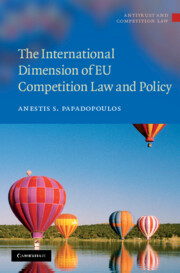Book contents
- Frontmatter
- Contents
- List of Tables
- Acknowledgements
- Abbreviations
- Table of Cases
- Table of Legislation
- Table of Treaties and Agreements
- 1 Introduction, Structure of the Book and Method
- 2 The National and International Dimensions of Competition Law and Policy
- 3 Bilateral Enforcement Cooperation Agreements
- 4 Bilateral Trade Agreements which Include Competition Provisions
- 5 Plurilateral Regional Agreements which Include Competition Provisions
- 6 The Role of Competition Law and Policy of the EU in Multilateral Negotiations on Competition
- 7 Conclusions: Main Findings of the Study
- Appendix 1 Economic Theories Applied to Competition Law
- Appendix 2 General Information about Plurilateral Regional Agreements
- Bibliography
- Index
7 - Conclusions: Main Findings of the Study
Published online by Cambridge University Press: 10 November 2010
- Frontmatter
- Contents
- List of Tables
- Acknowledgements
- Abbreviations
- Table of Cases
- Table of Legislation
- Table of Treaties and Agreements
- 1 Introduction, Structure of the Book and Method
- 2 The National and International Dimensions of Competition Law and Policy
- 3 Bilateral Enforcement Cooperation Agreements
- 4 Bilateral Trade Agreements which Include Competition Provisions
- 5 Plurilateral Regional Agreements which Include Competition Provisions
- 6 The Role of Competition Law and Policy of the EU in Multilateral Negotiations on Competition
- 7 Conclusions: Main Findings of the Study
- Appendix 1 Economic Theories Applied to Competition Law
- Appendix 2 General Information about Plurilateral Regional Agreements
- Bibliography
- Index
Summary
General observations
This book has examined, through the lens of the EU, the process of internationalisation of competition rules by analysing different types of international agreements that include competition provisions. The book initially pointed out that competition law and policy co-exists with a number of other national policies which may also have an influence on the application of competition rules. Despite the identification of numerous factors upon which the particular application of competition law is dependent at national level, this book has not attempted to question the usefulness and validity of competition law and policy. In fact, statistics compiled for the purposes of the study show that competition law is a legal instrument adopted by more than half of the countries in the world, while most of them have adopted competition law in the last fifteen years. These statistics may themselves answer the question regarding whether competition law is considered an important instrument for the regulation of business practices in economies that are becoming increasingly liberalised.
On the other hand, the discussion developed in the second chapter of the book reminds us that competition rules are not a panacea, a solution for all the problems that may arise from the activities of private firms in the markets. In contrast, other public policies and sectoral regulations co-exist with competition laws on a national level and are employed to address the various issues related to the activity of such firms.
- Type
- Chapter
- Information
- The International Dimension of EU Competition Law and Policy , pp. 258 - 267Publisher: Cambridge University PressPrint publication year: 2010



